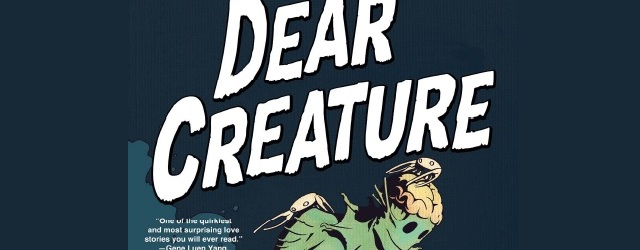
Dear Creature HC
Publisher: Dark Horse
Writer & Artist: Jonathan Case
Review by Anelise Farris
 Dear Creature, by Jonathan Case, is an award-winning debut graphic novel that was first published in 2011 through Tor Books. And, on September 28, 2016, Dark Horse will publish a brand-new hardcover edition of Dear Creature. This hardcover edition includes a new introduction (in graphic form) by Craig Thompson, creator of graphic novels such as Blankets (2003) and Habibi (2011). Thompson’s introduction contains helpful background information about the author (such as the fact that Case spent much of his adolescence on a boat); his artistic style (a master of chiaroscuro through his deft use of black and white); and, the variety of texts that influenced Dear Creature (we have quite the range here, from classic literature to b-horror movies).
Dear Creature, by Jonathan Case, is an award-winning debut graphic novel that was first published in 2011 through Tor Books. And, on September 28, 2016, Dark Horse will publish a brand-new hardcover edition of Dear Creature. This hardcover edition includes a new introduction (in graphic form) by Craig Thompson, creator of graphic novels such as Blankets (2003) and Habibi (2011). Thompson’s introduction contains helpful background information about the author (such as the fact that Case spent much of his adolescence on a boat); his artistic style (a master of chiaroscuro through his deft use of black and white); and, the variety of texts that influenced Dear Creature (we have quite the range here, from classic literature to b-horror movies).
The hardcover edition also provides readers with the 2011 introduction written by illustrator Steve Lieber (notable works include Whiteout, 1998, and Whiteout: Melt, 2000). Lieber’s introduction is full of praise for Case’s debut graphic novel—attesting that Dear Creature is packed with fantastic art, writing, and composition, as well as a really compelling storyline. I am a reader coming to Dear Creature for the first time, and after reading the praise this work has received by two comic book creators I deeply admire, I was super excited to delve into this text.
Meet Grue: a sea mutant who has quite the sophisticated vocabulary and reading interest—yet suffers from loneliness. After finding pages from William Shakespeare’s plays in glass bottles, Grue becomes intent on finding his true love. In order to do so, Grue decides that he will cast off his “monster” ways, giving up his normal diet of human beachgoers, so that he can find a lover who will accept him. As fate would have it, Grue meets the woman who is tossing Shakespeare’s plays into the ocean, and he and Giulietta have an instant bond—not only over Shakespeare but also in how they are both construed as monsters by those around them. Case’s choice to solely use black and white captures the 1950s/60s vibe perfectly, and the intricate shading and detail in each panel requires the reader to both linger and re-visit this unexpected story about a Shakespeare-loving monster. With Dear Creature, Jonathan Case offers readers a refreshingly different love story about a pair of doomed lovers that Shakespeare himself would have admired.
Verdict:
Buy it! I study and teach English, so I spend a lot of time with William Shakespeare, but I have yet to see 1950s/60s-style monster movies and Shakespeare occupy the same space. And yet, Case makes it work ridiculously well together: retro art and emotive writing come together so that Dear Creature is not grotesque or silly but heartfelt and sincere and fantastically weird.



